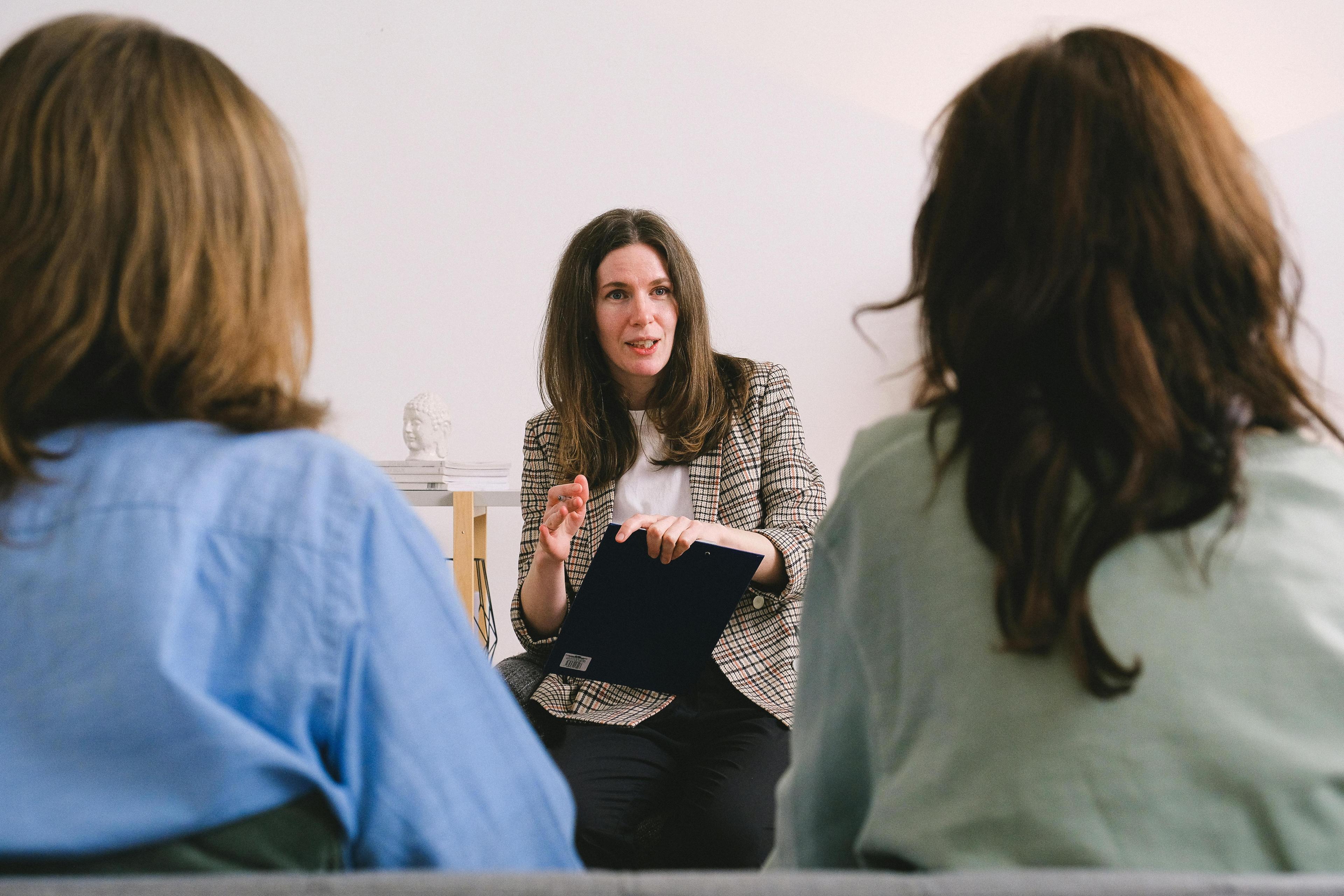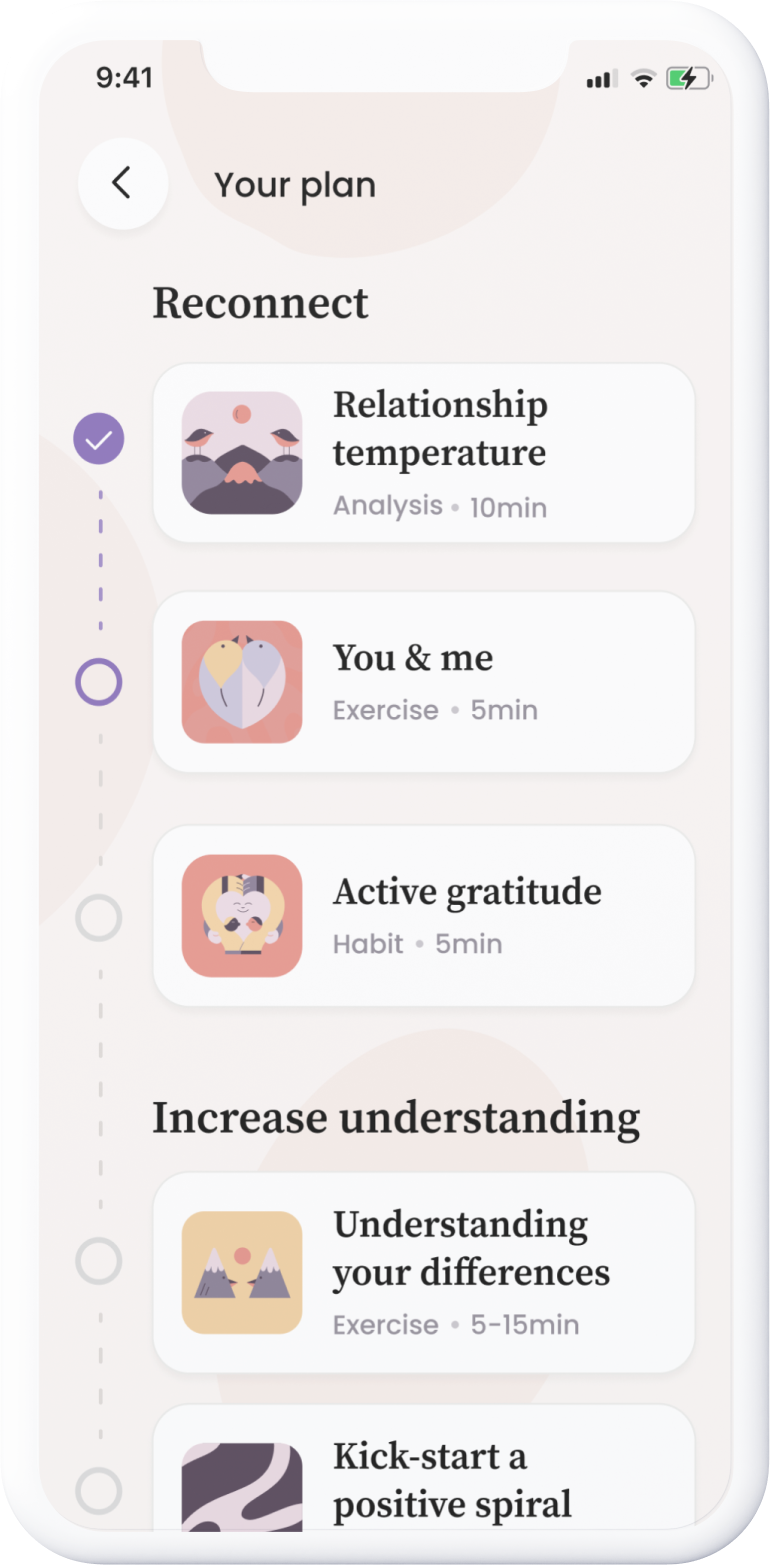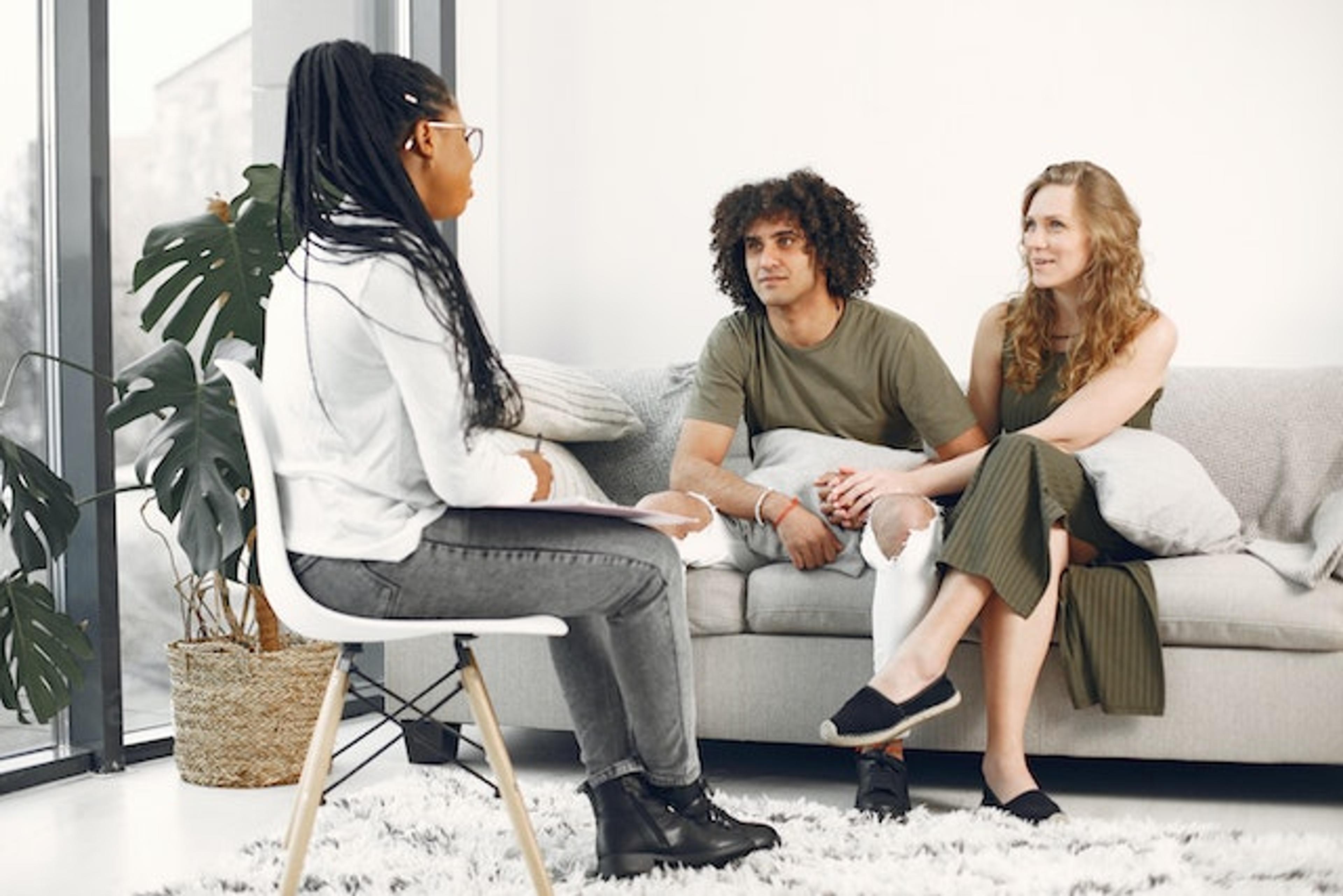
Are you considering couples counselling? Do you want to know more about what to expect from couples counselling and how it works before contacting to schedule an appointment? Or do you have questions about how you can develop your relationship on your own to get closer to your partner? The psychologists at Ally answer your questions!
What to expect from couples counselling
In couples counselling, you and your partner meet with a therapist together. The therapy usually aims to resolve relationship problems that one or both of you are experiencing.
It could be that you've grown apart, no longer have fun together, have difficulty communicating, or frequently have conflicts. Learn more about couples therapy.
How often should you have couples counselling?
It varies! It's common to attend couples counselling every other to every third week, but in the case of significant relationship problems, you may need to meet weekly.
It's important to have a certain continuity in therapy, at least in the beginning. However, over time, couples often become more self-sufficient in understanding and resolving their relationship problems, and then sessions may be spaced out. A therapy session is usually about an hour long, but this also varies between different therapists and therapy approaches.
Most couples attend therapy at least 10 times, but it varies widely from couple to couple. Most often, you meet the therapist in person, but therapy sessions via video call are also available.
What topics are discussed?
It depends on the relationship problems that exist! Common topics in couples counselling include emotional understanding, communication/conflict management, and finding common approaches where the couple learns to understand and solve their relationship problems on their own.
How much does couples counselling cost?
It varies between different therapists and depending on other factors such as session length. We recommend searching on the internet to find out. Do you want to find a therapist near you? We've compiled a directory of committed psychologists and therapists in different countries and cities. Read more.
What is the role of the couples therapist?
The couples therapist acts as a guide to help you reach out to each other better. The therapist helps you see your relationship from a new perspective and increase your understanding of each other's thoughts, feelings, and actions.
A couples therapist asks many questions and shares the conversation between you. The therapist can also teach new ways of communication and help you listen and understand each other better. You often get a relationship exercise as homework to work on until the next session.
How effective is it?
Research shows that couples who have undergone couples counselling perceive their relationship as better than couples with the same starting point who have not.
Around 70% of couples who undergo couples counselling experience an improvement.
How do you know when it's time to seek help?
When one of you feels bad in the relationship and you feel like you can't solve your difficulties on your own, it's time! A clear sign that there are major relationship problems is when the relationship often feels tough and drains your energy instead of giving you positive energy.
Common areas of difficulty can include:
- You argue, fight, or misunderstand each other often, and you can't solve it on your own.
- You talk less with each other and no longer confide in each other.
- One or both of you feel alone in the relationship and miss support from the other.
- You're no longer physically close and intimate, often decreasing sex drive.
- You have decreased trust in each other.
Most couples who seek couples counselling have experienced their problems for many years (the average is six years). Unfortunately, the problems have often grown big by then. Addressing relationship problems or friction in the relationship early on is very positive. Then, just a few therapy sessions can often solve the problems.
What different types of couples counselling are there?
There are many different forms of couples counselling/therpay based on different methods. Here we mention three common ones.
Integrative Behavioral Couple Therapy (IBCT)
Integrative Behavioral Couple Therapy (IBCT) is one of the most well-studied and used methods. The method integrates change strategies (the main focus of traditional couples therapy with a behavioural therapy foundation) with acceptance work.
Emotionally Focused Therapy for Couples (EFT)
There are also methods based on research on emotions and interactions, such as Emotionally Focused Therapy for Couples (EFT).
Systemic Couple Therapy
There are methods based on the idea that the relationship is a system with mutual dependence on each other. An example is Systemic Couple Therapy.
Is online couples therapy available?
Several therapists now offer online couples therapy via video calls. It can be a flexible solution if you don't have access to a couples therapist locally. There's also the option to work on the relationship entirely on your own without involvement from a third party, providing even more flexibility, such as through an app, like Ally.
How can you start working on your relationship on your own with tools from couples therapy?
Is it perhaps not the right time for couples counselling? Maybe you want to get started on your own first. A first step could be to try the app Ally Couples. The content in Ally is developed by us psychologists and is based on evidence-based methods for couples therapy.
What questions are asked in couples counselling?
It depends a bit! There are different approaches to couples counselling, so therapists may ask slightly different questions. But generally, the questions often asked at the first session are about understanding and mapping out how the relationship works. The therapist then turns to each of you in the couple to get answers. An important role the therapist has is to ensure that not only the person who naturally speaks the most in the room gets to describe the relationship alone. The therapist usually asks the following, or similar questions.
Common questions asked
- Tell me about what you see as problematic in your relationship?
- Describe a typical situation when things get difficult in the relationship (for example, a conflict). What happens in the moment and what are the consequences afterward?
- What is the difference between good and bad times? What is different on the days when the relationship works better?
- When did the problems start? Have they come suddenly/after any specific event or developed gradually?
- Has anything happened in your relationship or in life in general that you think has affected your relationship problems?
- How did you get to know each other and become a couple?
- What attracted and appreciated you about each other in the beginning?
- How did the relationship work in the beginning? (what worked well? what did you do together?). Were there any problems already then?
- What do you see as positive aspects of your partner?
- How have previous relationships worked for you? Have there been any similar, or other difficulties?
- Tell me about your childhood and your parents' relationship. How was love shown? How were problems addressed if there were any?
- What do you hope couples therapy will lead to? In what way do you wish the relationship to change?
- How would your relationship look if the problems disappeared? What would be different compared to how it is now?
- How do you want to be a partner?
In the method IBCT (Integrative Behavioral Couple Therapy), after the first session, individual sessions are held with each person of the couple. In these sessions, deeper questions are asked about each person's view on relationship problems, their own well-being, their relationship history (upbringing, previous relationships), and values, and their own contribution to the couple's relationship (how do I want to be as a partner and how can I act more as I wish).
Then, the couple meets again with the therapist, who presents a summary of the couple's problem picture based on the framework DEEP, which you can read more about here: The Method behind Ally.
Read more about relationship problems!
Do you have questions about relationship problems? What are the most common relationship problems? Where can we get help with relationship problems? Read more in this post: Common Relationship Problems.
Do you want to improve your relationship on your own?
Do you want to strengthen and improve your relationship? Maybe there are some relationship problems, but not to the extent that couples counselling is an option for you. Try our relationship app Ally Couples.
With Ally, you take the temperature of the relationship, continue working with recommended relationship exercises (packaged in individual series and couple series), and get started with exciting conversations via the feature "Daily Questions" where you get questions to answer about each other!








